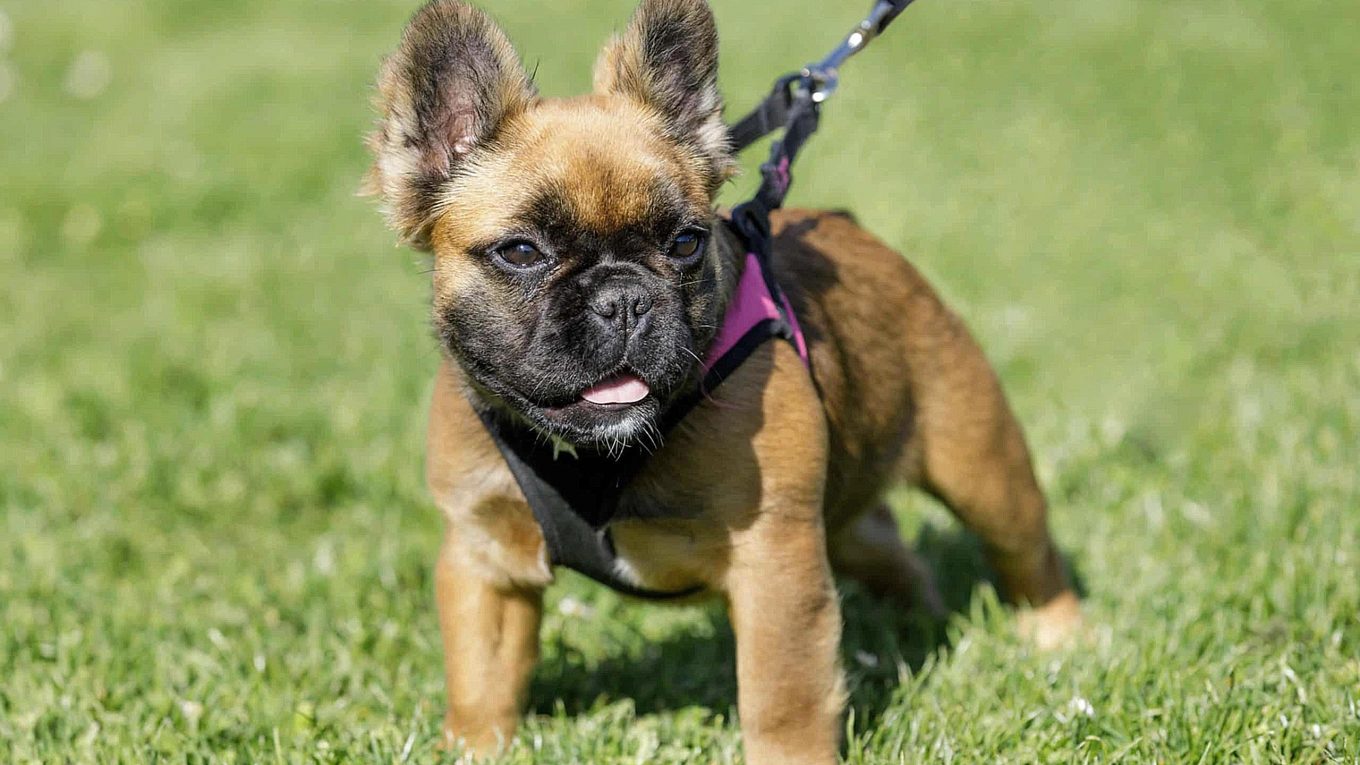Do French bulldogs go to the vet a lot?
Prepare to fall head over paws for these adorable pups. With their squishy faces and loving personalities, it’s easy to see why they’re such popular companions.
But before you bring one home, it’s important to know about their healthcare needs. Today, we’re digging into the topic of vet visits for French bulldogs.
Yep, those regular check-ups that keep our furry friends in tip-top shape. We’ll cover everything from why they’re necessary to how often you should schedule them.
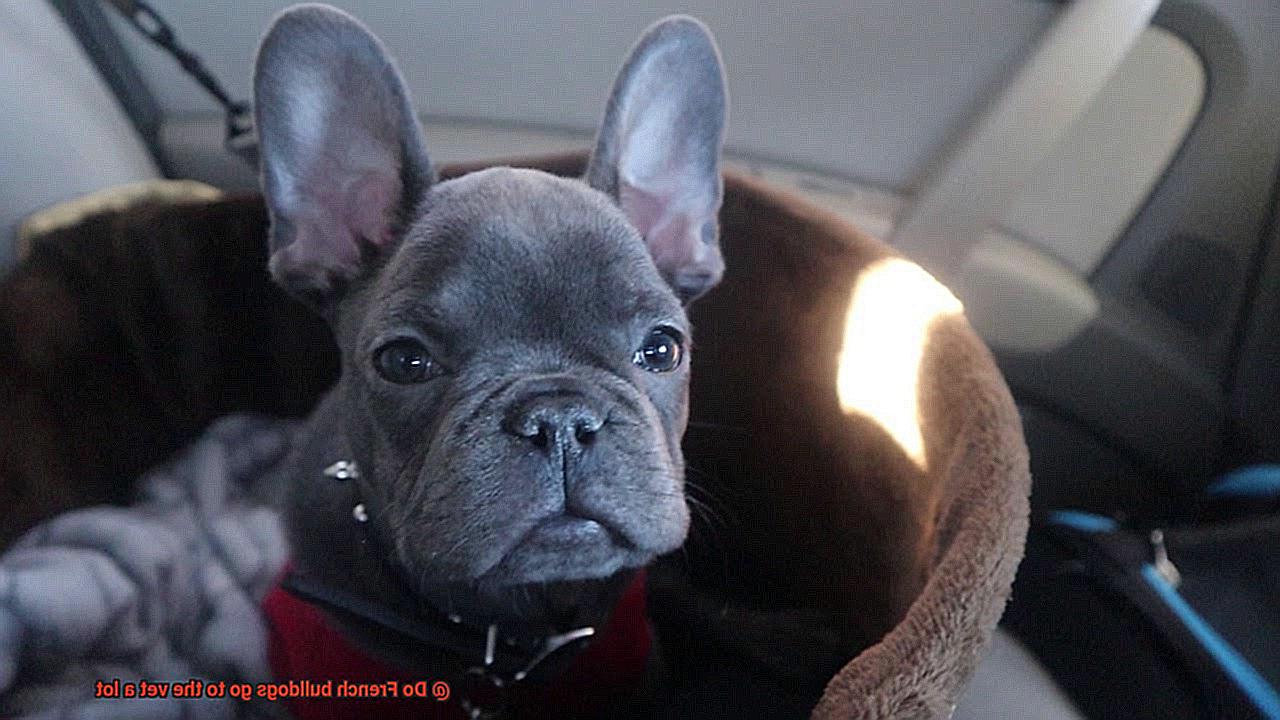
So let’s roll up our sleeves (or rather, our sleeves of fur) and make sure your French bulldog lives their best life.
The Unique Anatomy of French Bulldogs
Contents
- 1 The Unique Anatomy of French Bulldogs
- 2 Breathing Difficulties in French Bulldogs
- 3 Eye Problems Commonly Seen in French Bulldogs
- 4 Dental Care for French Bulldogs
- 5 Genetic Health Conditions in French Bulldogs
- 6 Establishing a Relationship with a Trusted Veterinarian
- 7 Regular Check-Ups, Vaccinations, and Preventive Care
- 8 Diet and Exercise Considerations for French Bulldogs
- 9 Conclusion
French Bulldogs are beloved for their adorable appearance and charming personality. However, their unique anatomy sets them apart from other dog breeds and comes with its own set of considerations.
In this blog post, we will explore the distinctive features of French Bulldogs’ anatomy and how they can lead to potential health issues.
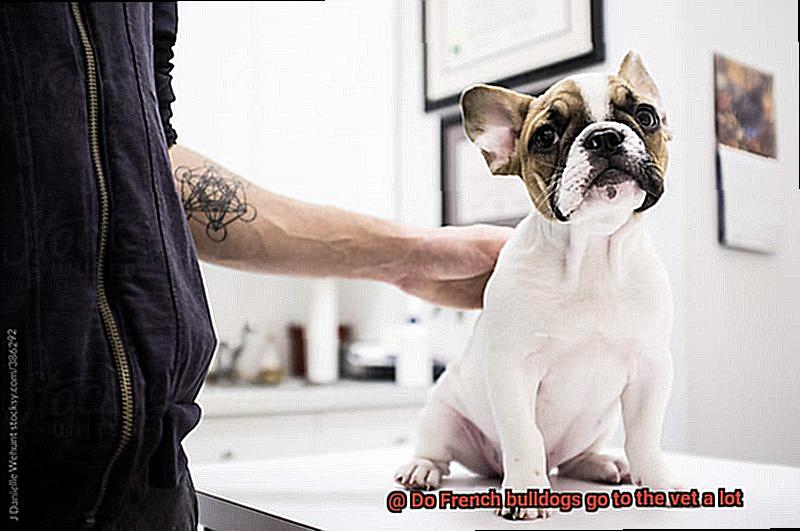
By understanding their anatomy, owners can better care for their furry friends and ensure they lead a happy and healthy life.
The Brachycephalic Face
French Bulldogs are known for their flat, pushed-in faces, a characteristic called brachycephaly. While this feature adds to their cuteness, it can also lead to respiratory problems.
Their shortened airways can make breathing more difficult, resulting in snoring, snorting, and even sleep apnea. Owners should be vigilant about monitoring their breathing and seek veterinary care if any respiratory distress is observed.
Compact Body Structure
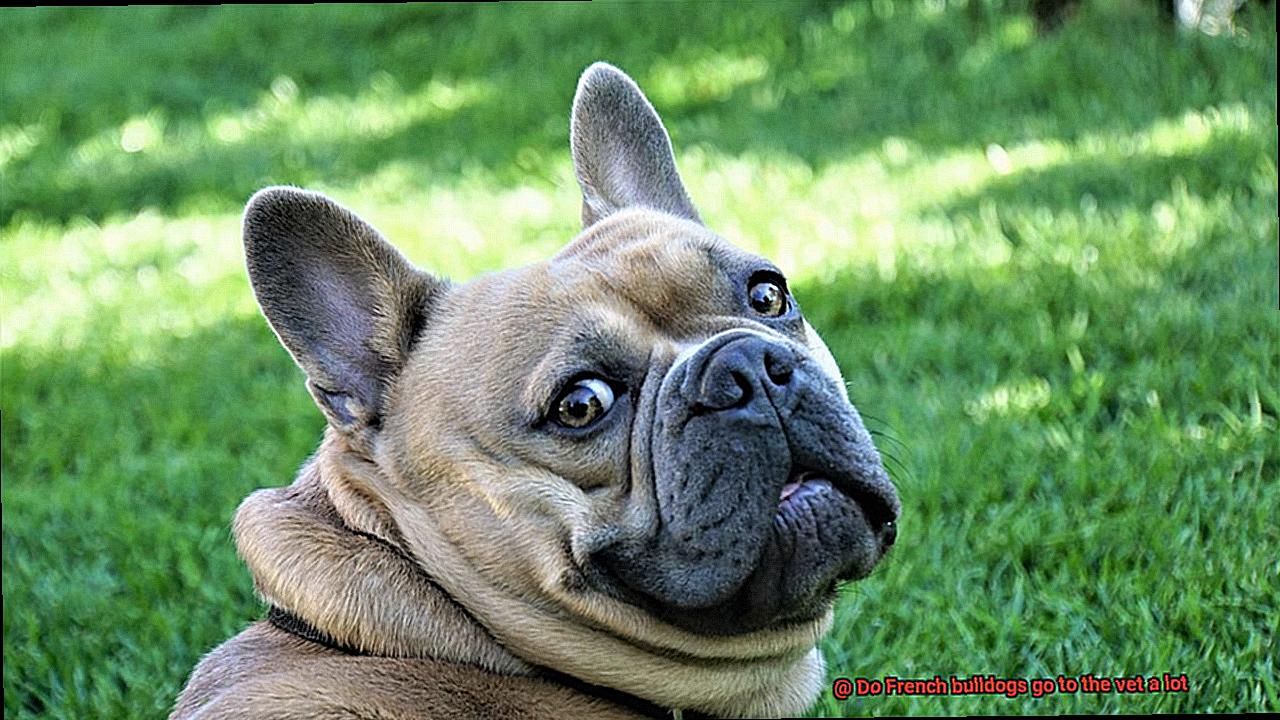
French Bulldogs have a stocky build with a wide chest and short legs. While this gives them a unique appearance, it also makes them prone to joint problems.
Conditions such as hip dysplasia and patellar luxation can cause pain, lameness, and difficulty in movement. Regular vet visits are essential for diagnosing and managing these joint issues early on.
Skin and Coat Characteristics
French Bulldogs have loose, wrinkled skin, especially around their face and neck. While these wrinkles add to their charm, they require regular cleaning and maintenance to prevent skin problems.
Moisture trapped in the folds can lead to bacterial or yeast infections. Owners should clean the wrinkles carefully using a damp cloth or specialized wipes recommended by a veterinarian.
Sensitive Stomachs
French Bulldogs often have sensitive stomachs and may experience digestive issues such as food allergies or sensitivities. It’s crucial for owners to provide a balanced and appropriate diet, free from potential triggers.
Regular vet visits can help identify these triggers and provide guidance on proper nutrition for French Bulldogs.
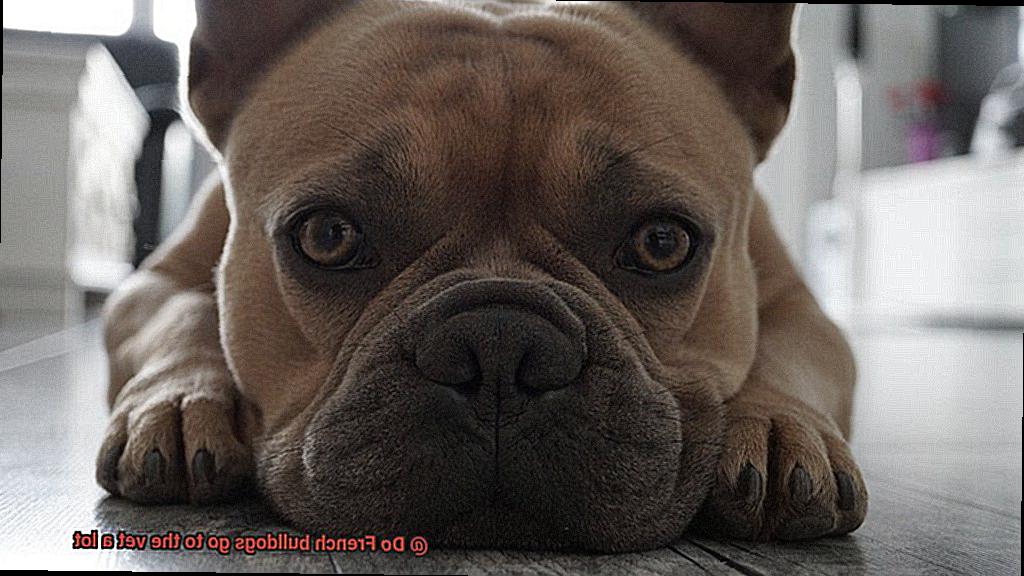
Genetic Predispositions
French Bulldogs have a higher genetic predisposition to certain health conditions compared to other breeds. These may include heart diseases, eye problems like cataracts or cherry eye, and spinal disorders like intervertebral disc disease.
Regular vet check-ups are vital for early detection and appropriate treatment options.
Breathing Difficulties in French Bulldogs
French Bulldogs are undeniably charming and beloved pets, but their distinctive facial structure can sometimes lead to breathing difficulties.
In this blog post, we will explore the causes behind these issues, shed light on potential treatments, and provide essential information to help French Bulldog owners navigate their pet’s respiratory health.
Causes of Breathing Difficulties in French Bulldogs:
Brachycephalic Airway Syndrome (BAS):
BAS encompasses several anatomical abnormalities that affect the upper airways of French Bulldogs. These include stenotic nares (narrowed nostrils), elongated soft palate, and everted laryngeal saccules. These structural irregularities restrict the airflow, resulting in breathing difficulties.
Heat and Exercise Intolerance:
Due to their compromised respiratory system, French Bulldogs may struggle to regulate body temperature efficiently, especially in hot weather or during vigorous exercise. This can further exacerbate breathing difficulties and potentially lead to heatstroke.
Treatment Options:
Consultation with a Veterinarian:
If you suspect your French Bulldog is experiencing breathing problems, it is essential to seek professional veterinary advice. A veterinarian can perform a comprehensive examination to assess the severity of the condition and recommend appropriate treatment options.
Weight Management:
Maintaining a healthy weight is crucial for French Bulldogs as excess weight can put additional strain on their respiratory system. Discuss with your veterinarian about appropriate portion sizes, feeding schedules, and suitable diet options for weight management.
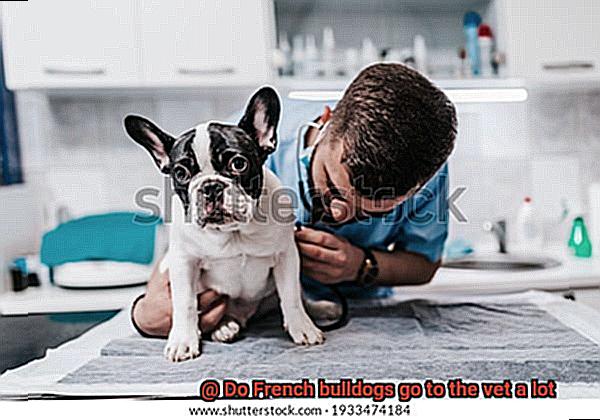
Environmental Modifications:
Creating a comfortable living environment for your French Bulldog is vital. Ensure proper ventilation, avoid exposing them to extreme temperatures, and provide access to cool areas during hot weather. Additionally, avoid strenuous exercise in unfavorable conditions to prevent respiratory distress.
Medications:
In some cases, veterinarians may prescribe medications to alleviate symptoms and manage breathing difficulties. These may include bronchodilators to widen the airways or anti-inflammatory drugs to reduce inflammation and swelling.
Surgical Intervention:
In severe cases of BAS, surgical correction may be necessary. Procedures such as nares widening, soft palate resection, and laryngeal saccule removal can improve airflow and alleviate breathing difficulties.
Eye Problems Commonly Seen in French Bulldogs
French Bulldogs are beloved for their unique appearance, and those adorable bulging eyes are often the highlight of their charm. However, these distinct features can also make them more prone to certain eye problems.
As an expert in French Bulldog health, I want to shed light on the eye issues commonly seen in this breed and provide valuable information to help owners identify and manage these problems effectively.
- Cherry Eye: This is one of the most prevalent eye problems in French Bulldogs, especially in younger dogs. Cherry eye occurs when the tear gland located in the corner of the eye pops out of place, resembling a cherry. While it is not typically painful, it can cause discomfort and may require surgical correction if it becomes chronic or affects the dog’s vision.
- Entropion: Another common eye problem in French Bulldogs is entropion, where the eyelids roll inward, causing the eyelashes to rub against the cornea. This condition can lead to chronic irritation, corneal ulcers, and even vision loss if left untreated. Regular eye checks are essential to detect signs such as excessive tearing, redness, or squinting.
- Dry Eyes (Keratoconjunctivitis Sicca): French Bulldogs are also prone to dry eyes, where there is insufficient tear production leading to dryness, inflammation, and potential corneal damage. Symptoms may include redness, discharge, frequent blinking, or pawing at the eyes. Treatment involves using artificial tears or ointments to lubricate the eyes and manage inflammation.
- Corneal Ulcers: These open sores on the surface of the cornea can occur due to trauma, foreign bodies, entropion, or dry eyes. Prompt veterinary attention is crucial to prevent complications like infection or scarring. Treatment may involve antibiotic eye drops, pain management, and addressing the underlying cause.
- Cataracts: As French Bulldogs age, they can develop cataracts, which are characterized by the clouding of the lens inside the eye. Regular eye examinations are essential to detect cataracts early on. Surgical removal of cataracts is often recommended to restore vision in affected dogs.
It is important for French Bulldog owners to be aware of these common eye problems and to seek veterinary care if any symptoms or concerns arise. Remember to consult with a veterinarian who specializes in ophthalmology for accurate diagnosis and appropriate treatment options.
Dental Care for French Bulldogs
Neglecting their dental care can lead to some serious problems down the line. So, let’s dive into the world of dental care for French Bulldogs and discover how to keep those pearly whites shining bright.
Brushing is Key:
Just like humans, French Bulldogs need regular tooth brushing to keep their teeth and gums healthy. Aim to brush their teeth at least two to three times a week using a dog-specific toothbrush and toothpaste. Trust me, your Frenchie will love the extra attention.
Chew Toys to the Rescue:
Chewing on appropriate toys not only keeps your Frenchie entertained but also helps remove plaque and tartar buildup. Look for dental toys specially designed to promote dental health. But remember, avoid hard toys that may damage their teeth – we want them to chew, not lose teeth.
Vet Check-Ups:
Regular visits to the vet are crucial for monitoring your Frenchie’s oral health. During these check-ups, the vet will examine their teeth and gums, checking for any signs of trouble. They may even perform a professional teeth cleaning if necessary. These visits should be scheduled at least once a year, but don’t hesitate to go more often if needed.
Dental Care Products:
If you want to go the extra mile, there are dental care products available that can supplement your Frenchie’s oral hygiene routine. Dental wipes or sprays can be used in between brushings to reduce bacteria and freshen breath. Dental treats and chews are also great options as they promote chewing and help keep those chompers clean.
Genetic Health Conditions in French Bulldogs
If you’re a proud owner of a French Bulldog, you may already know that these lovable pooches are prone to some unique genetic health conditions. But don’t fret. With a little knowledge and proactive care, you can keep your Frenchie happy and healthy for years to come.
Brachycephalic Airway Syndrome: A Breath of Fresh Air
French Bulldogs have a distinctive flat face, which can lead to breathing difficulties and respiratory problems. This condition, called brachycephalic airway syndrome, is characterized by narrowed nostrils, an elongated soft palate, and a small windpipe. To help your Frenchie breathe easier, keep them in a cool environment, avoid strenuous exercise in hot weather, and provide plenty of fresh water.
Intervertebral Disc Disease: Keeping Their Spine in Line
Another genetic health condition commonly seen in French Bulldogs is intervertebral disc disease. This condition affects the spinal discs and can result in pain, mobility issues, and even paralysis.
To minimize the risk, avoid activities that put strain on your Frenchie’s back, such as jumping from high surfaces or excessive rough play. Regular exercise and maintaining a healthy weight are also important for their overall spinal health.
Eyes Wide Open: Preventing Common Eye Problems
French Bulldogs are predisposed to several eye problems, including cherry eye (prolapsed gland of the third eyelid), entropion (inward rolling of the eyelid), and cataracts.
Keep an eye out for any signs of redness, discharge, or cloudiness in their eyes. Regularly cleaning their eyes with a veterinarian-approved solution can help prevent infections and keep their peepers sparkling.
Allergies: Scratching the Surface
Skin allergies are another common issue for Frenchies. These can manifest as itching, rashes, and hair loss. To keep those allergies at bay, avoid potential triggers such as certain food ingredients, environmental allergens like pollen or dust mites, and parasites like fleas. Regular bathing with a gentle shampoo can also help soothe their sensitive skin.
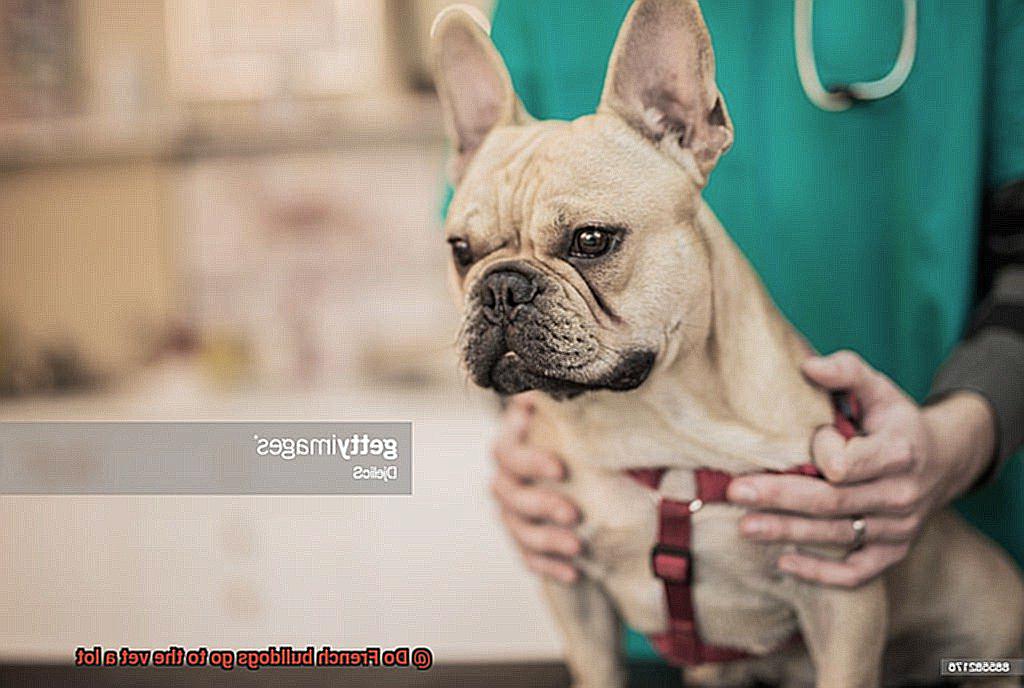
The Heart of the Matter: Congenital Heart Diseases
French Bulldogs can be prone to certain congenital heart diseases. While you can’t prevent these conditions entirely, regular veterinary check-ups can help detect any issues early on.
Your vet may recommend additional tests or treatments to manage the condition and keep your Frenchie’s ticker ticking.
Establishing a Relationship with a Trusted Veterinarian
Here are some tips on how to establish a paw-some relationship with a veterinarian who will give your Frenchie the top-notch care they deserve.
Do Your Research
Just like you would research the best dog food or the comfiest dog bed, take the time to research potential veterinarians. Look for ones that specialize in French bulldogs or have experience with brachycephalic breeds. They’ll be familiar with the unique health concerns of your Frenchie and can provide specialized care.
Ask for Recommendations
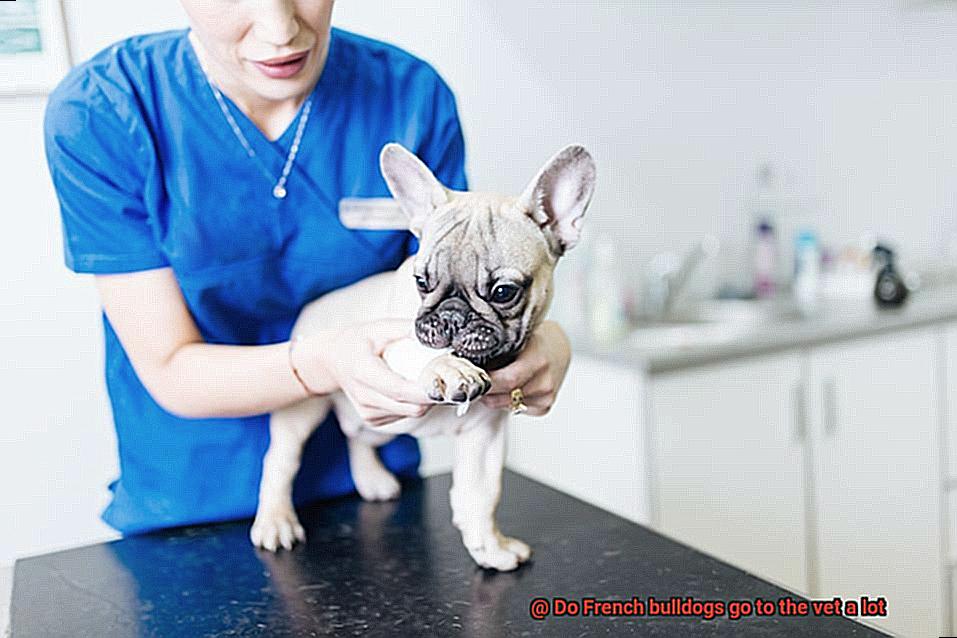
Don’t be shy about asking other French bulldog owners or local dog communities for recommendations. These furry friends and their parents can share their experiences and help you find a veterinarian who’s trusted by the community.
Schedule an Initial Visit
Once you’ve found a potential veterinarian, schedule an initial visit to meet them in person. This is like a playdate for your Frenchie and the vet. Use this time to discuss your dog’s health history and any specific concerns you may have. This visit will help you gauge if this veterinarian is the right fit for your Frenchie.
Build Trust through Communication
Trust is built on open communication, so make sure to share any concerns or changes in your Frenchie’s behavior or health with your veterinarian promptly. Regular follow-up visits will ensure that your vet can monitor your furry friend’s health and make any necessary adjustments to their care plan.
Beyond Medical Care
A good veterinarian provides more than just medical care. They can offer advice on nutrition, exercise, grooming, and other aspects of caring for your French bulldog. Make sure to take advantage of their expertise to keep your Frenchie feeling their best.
Regular Check-Ups, Vaccinations, and Preventive Care
Your French bulldog is more than just a pet – they’re a beloved member of your family. Just like any family member, they deserve the best care possible to ensure a long, happy, and healthy life.
Regular check-ups, vaccinations, and preventive care play a vital role in keeping your Frenchie fit and fabulous. In this blog post, we’ll explore why these essential aspects of pet care are so important for French bulldogs.
Regular Check-Ups:
Regular visits to the vet are crucial for monitoring your French bulldog’s overall health and detecting any potential issues early on.
During these check-ups, the vet will conduct a comprehensive physical examination to assess your Frenchie’s body condition, dental health, and look for any signs of illness or abnormalities. They can also provide advice on nutrition, exercise routines, and behavioral concerns specific to French bulldogs.
Vaccinations:
Vaccinations are like superheroes that protect your furry friend from harmful diseases. French bulldogs require a series of vaccinations starting at around 6-8 weeks of age, followed by booster shots at specific intervals.
These vaccinations shield them against diseases such as rabies, distemper, parvovirus, and canine adenovirus. Staying up-to-date with their vaccination schedule is crucial to ensure maximum protection against these potentially life-threatening illnesses.
Preventive Care:
Preventive care is all about taking proactive steps to keep your French bulldog healthy and happy. This includes providing them with a balanced diet tailored to their specific needs, regular exercise to keep them fit and maintain a healthy weight, and proper dental care to prevent dental diseases.
Additionally, implementing parasite control measures like flea and tick prevention is essential for protecting your Frenchie from external parasites that can cause discomfort and transmit diseases. Regular grooming sessions will help keep their coat clean, shiny, and free from mats or skin irritations.
Diet and Exercise Considerations for French Bulldogs
French Bulldogs are adorable little bundles of joy, but they have a tendency to gain weight easily. To keep your Frenchie fit and fabulous, here are some diet and exercise considerations to keep in mind:
A Balanced Diet:
- French Bulldogs need a high-quality diet that is appropriate for their age, size, and activity level.
- Consult with a veterinarian or a canine nutritionist to determine the best diet plan for your Frenchie.
- Feed them small, frequent meals throughout the day to prevent overeating and aid digestion.
- Avoid feeding them table scraps or human food as it can cause digestive upset.
- Introduce new foods gradually to avoid any adverse reactions.
Exercise:
- Regular exercise is important for maintaining a healthy weight and overall well-being.
- Their exercise needs may vary depending on factors like age, health condition, and energy levels.
- While French Bulldogs are not high-energy dogs, they still require daily exercise to prevent obesity and keep their muscles toned.
- Short walks, playtime in a secure area, and mental stimulation activities like puzzle toys can be beneficial.
- Remember that French Bulldogs are brachycephalic breeds with compromised breathing abilities. Exercise should be moderate, and they should not be overexerted, especially in hot or humid weather conditions.
-iVFbpLIlXY” >
Conclusion
In conclusion, French bulldogs do require regular visits to the vet.
These adorable little dogs may have some health issues that need to be addressed, such as respiratory problems and skin allergies. It is important for their owners to be proactive in monitoring their health and seeking veterinary care when needed.
So, while they may not go to the vet excessively, it is essential to prioritize their healthcare needs.
